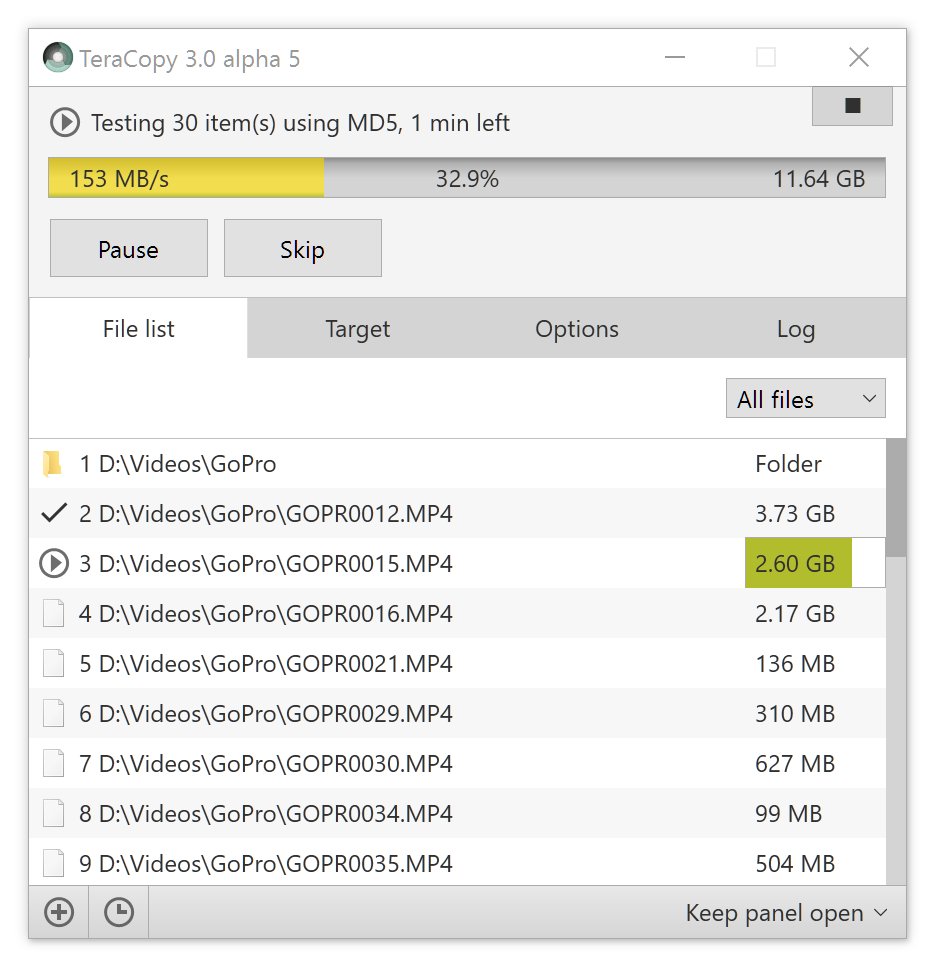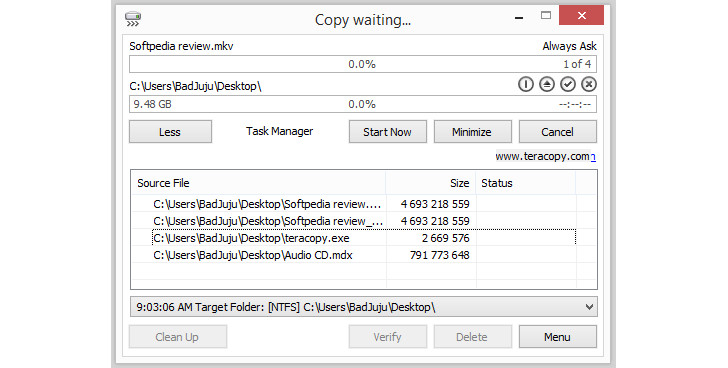

- #Teracopy verify only portable
- #Teracopy verify only Pc
- #Teracopy verify only download
- #Teracopy verify only free
- #Teracopy verify only windows

It was always my understanding that quick removal is safest, because it disables write caching. BTW, I have Asmedia USB 3.0 ports on this computer as well, policy set to quick removal (default). This one is a simple fix that anyone should be able to use.

#Teracopy verify only Pc
This fix worked on my PC as well as my buddy's for the built-in Asmedia USB 3.0 ports. Probably any card using that chipset would have worked.Ģ) Changed the Policy for the USB drive in device manager to "Better Performance" instead of "Quick Removal". This PCI card uses the NEC/Renesas uDP720201 chipset. Worked perfectly on the same PC that was corrupting data through its built-in Asmedia USB 3.0 ports. Me and a buddy have documented this same problem on Win7 圆4 using Biostar MB's with the Asmedia USB 3.0 chipset.ġ) purchased a Vantec 4-Port SuperSpeed USB 3.0 PCIe Host Card with Internal 20-Pin Connector UGT-PC345. Thank you for detailing how removing MSE helped. My first approach would be the other methods, and not removing MSE.

The thread I listed above also mentions MSE as a contributing factor in combination with the other options I mentioned above. I just preferred to use the built in explorer. Not suggesting your issue will be the same, but thought it was worth sharing.īTW, while experimenting I did try TeraCopy and the copies were verified to be good. I don't think it's solely MSE's fault, as I can't believe the millions of other users would not have encountered the problem, but maybe the combination of that with my disk controller perhaps is responsible. After this point, I stopped using MSE, and since then no more problems ever with file corruption! Just to round it off, no problems before using MSE, no problems after removing it, but problems while it was installed.
#Teracopy verify only windows
Maybe MSE locks the file while scanning and this interferes with the copying process, just a wild stab in the dark 'no-evidence-kind-of-guess'.Īfter some experimenting, I discovered that removing MSE solved the file corruption problem copying using Windows Explorer. The problem only seemed to be occur more when copying large file (at least 256MB, but usually larger when using hard drives). I was 95% sure it was not the drives or the cables as they would work fine on other machines.
#Teracopy verify only portable
In my case, it occurred with both USB2 (4GB) pen drives, and also portable USB2 portable hard drives (between 320 MB and 1TB) on Windows 7 (64 bit), and all using the 'safe removal' option. It was only because the files were compressed, and the fact that they failed the checksum checks that I knew the files were corrupted. There were no logs or errors about disk controller faults or anything like that. I had exactly the same problem more than a year ago and it really annoyed me as it corrupted a 'seemingly random' selection of my valuable backup files, and without verifying afterwards, it was impossible to tell if the file was corrupted or not as Windows did not complain about any errors. Just make sure to tag the post with the flair and give a little background info/context.Do you use Microsoft Security Essentials antivirus by any chance? On Fridays we'll allow posts that don't normally fit in the usual data-hoarding theme, including posts that would usually be removed by rule 4: “No memes or 'look at this '”
#Teracopy verify only free
No memes or 'look at this old storage medium/ connection speed/purchase' (except on Free Post Fridays).Search the Internet, this subreddit and our wiki before posting.R/DataHorader 2013-2023 Searchable Archives
#Teracopy verify only download
Historic Reddit Archives & Download Tools, Etc.ģ.3v Pin Reset Directions :D / Alt Imgur link And we're trying really hard not to forget. Along the way we have sought out like-minded individuals to exchange strategies, war stories, and cautionary tales of failures. Everyone has their reasons for curating the data they have decided to keep (either forever or For A Damn Long Timetm). government or corporate espionage), cultural and familial archivists, internet collapse preppers, and people who do it themselves so they're sure it's done right. Among us are represented the various reasons to keep data - legal requirements, competitive requirements, uncertainty of permanence of cloud services, distaste for transmitting your data externally (e.g.


 0 kommentar(er)
0 kommentar(er)
